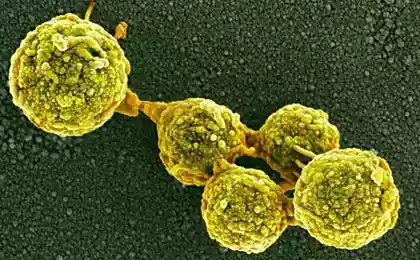247
Doctors are sick and patients are sick. . .
In our time, there is still a belief that ordinary common sense is enough to understand health, and that the meaning of the concept of “being healthy” is intuitively understood by everyone in the same way.
Usually this understanding consists in the judgment: "Healthy - that is, not sick." Absolute health is considered an unattainable ideal, which is expressed as a simple sum of the average medical standards - pressure 120/80, pulse 70-90, hemoglobin level in the blood 120-140 and so on. In fact, the state of health equates to “no complaints, tests are normal”.
This is due to the fact that in everyday life we tend to pay much more attention to various disorders and imbalances, understanding health only as the absence of disease. After all, many of us are still trapped in the traditional medical model, which suggests that pathology and disease are more real and reliable than health and mental well-being.

Doctors are sick and patients are sick.
Accordingly, a healthy person appears as an impersonal bearer of the norms common to all - it is, first of all, a "man without defects." But then it turns out that this is almost the same as a “man without properties.”
Has health always been that way?
Turns out not.
The ancient philosopher Democritus once wrote to Hippocrates: “People ask the gods for health in their prayers, and they do not know that they themselves have the means for this.”
In the fifth century BC. Alcmeon was given the definition Health is the harmony or balance of oppositely directed forces. And the point of view of the famous ancient philosopher Plato was that health is expressed in the proportionality of the mental and physical. Health, like beauty, is determined by proportionality and requires the consent of opposites.
Cicero characterized health as the correct ratio of various mental states, but the most general idea reflects Plato’s definition.
The Stoics (Marc Aurelius, Seneca) have given the following definition: health is not only equilibrium (consistency and unison of the soul and body), but, mainly, health is not only equilibrium. The state in which the soul and body obey the laws of the integrity of nature.
And healing in the ancient world is seen as the restoration of lost integrity (and-with-goal), therefore, healing is the systematic provision of this integrity.
Thus, Greek and Roman philosophers considered primarily the intrapersonal aspect of health, namely, the internal coherence of bodily and mental manifestations of a person. To be beautiful and healthy, it is not enough to perfect the body or to harmonize the soul. It is necessary to feel their optimal ratio.
Gradually, as industrial society developed, this understanding of health was lost.
And only in the last 20 years, scientists again turned to the study of the role of psychological factors of physical health. There was even a new science, the psychology of health – the science of the psychological causes of health, the methods and means of its preservation, strengthening and development. It was in the last 20 years that we began to hear that “all diseases are from nerves” and learned about the existence of a mysterious phenomenon called “psychosomatics”. Despite the fact that at the everyday level, these concepts are quite discredited, acting in some cases as an object for humor, scientists have obtained real scientific evidence of the dependence of the state of health on the psychological and even spiritual characteristics of a person.
In particular, it is now reliably established that the following psychological reasons have a significant impact on health:

In this regard, we can confidently say that each person has inner spiritual and spiritual resources necessary for healing, that each person by nature is endowed with his own potential to manage his health, which is often completely unclaimed and unrealized.
In order to use this potential, you need only two conditions: take responsibility for your health (possibly “taking” it from doctors and tablets) and master the simple rules of psychological health hygiene. published
Author: Margarita Novitskaya
P.S. And remember, just changing our consumption – together we change the world!
Source: www.b17.ru/article/10549/
Usually this understanding consists in the judgment: "Healthy - that is, not sick." Absolute health is considered an unattainable ideal, which is expressed as a simple sum of the average medical standards - pressure 120/80, pulse 70-90, hemoglobin level in the blood 120-140 and so on. In fact, the state of health equates to “no complaints, tests are normal”.
This is due to the fact that in everyday life we tend to pay much more attention to various disorders and imbalances, understanding health only as the absence of disease. After all, many of us are still trapped in the traditional medical model, which suggests that pathology and disease are more real and reliable than health and mental well-being.

Doctors are sick and patients are sick.
Accordingly, a healthy person appears as an impersonal bearer of the norms common to all - it is, first of all, a "man without defects." But then it turns out that this is almost the same as a “man without properties.”
Has health always been that way?
Turns out not.
The ancient philosopher Democritus once wrote to Hippocrates: “People ask the gods for health in their prayers, and they do not know that they themselves have the means for this.”
In the fifth century BC. Alcmeon was given the definition Health is the harmony or balance of oppositely directed forces. And the point of view of the famous ancient philosopher Plato was that health is expressed in the proportionality of the mental and physical. Health, like beauty, is determined by proportionality and requires the consent of opposites.
Cicero characterized health as the correct ratio of various mental states, but the most general idea reflects Plato’s definition.
The Stoics (Marc Aurelius, Seneca) have given the following definition: health is not only equilibrium (consistency and unison of the soul and body), but, mainly, health is not only equilibrium. The state in which the soul and body obey the laws of the integrity of nature.
And healing in the ancient world is seen as the restoration of lost integrity (and-with-goal), therefore, healing is the systematic provision of this integrity.
Thus, Greek and Roman philosophers considered primarily the intrapersonal aspect of health, namely, the internal coherence of bodily and mental manifestations of a person. To be beautiful and healthy, it is not enough to perfect the body or to harmonize the soul. It is necessary to feel their optimal ratio.
Gradually, as industrial society developed, this understanding of health was lost.
And only in the last 20 years, scientists again turned to the study of the role of psychological factors of physical health. There was even a new science, the psychology of health – the science of the psychological causes of health, the methods and means of its preservation, strengthening and development. It was in the last 20 years that we began to hear that “all diseases are from nerves” and learned about the existence of a mysterious phenomenon called “psychosomatics”. Despite the fact that at the everyday level, these concepts are quite discredited, acting in some cases as an object for humor, scientists have obtained real scientific evidence of the dependence of the state of health on the psychological and even spiritual characteristics of a person.
In particular, it is now reliably established that the following psychological reasons have a significant impact on health:
- behavior (e.g., aggressiveness, ambition and fast pace of activity predispose to cardiovascular disease)
- attitude (Optimism and pessimism, for example)
- prevailing (In particular, angry people have a greater risk of heart attack)
- values and attitudes, own ideas about health, norm and pathology;
- social environment (family and opposite sex relations, professional environment, standard of living and belonging to a particular social class);
- sex factor, nationality;
- Individual style of coping with difficult life situations (So-called coping strategies)
- individual propensity to use and abuse substances (alcohol, nicotine, food)
- attitude to compliance with the rules of a healthy lifestyle;
- individual characteristics of the disease (The ability to adapt to the disease).

In this regard, we can confidently say that each person has inner spiritual and spiritual resources necessary for healing, that each person by nature is endowed with his own potential to manage his health, which is often completely unclaimed and unrealized.
In order to use this potential, you need only two conditions: take responsibility for your health (possibly “taking” it from doctors and tablets) and master the simple rules of psychological health hygiene. published
Author: Margarita Novitskaya
P.S. And remember, just changing our consumption – together we change the world!
Source: www.b17.ru/article/10549/























